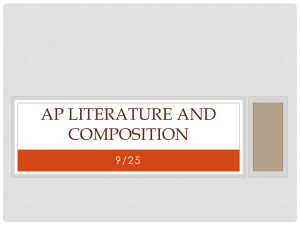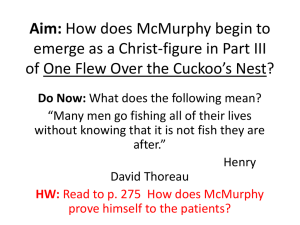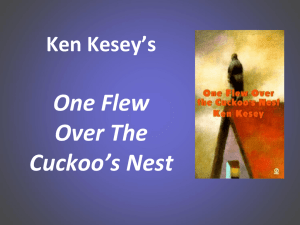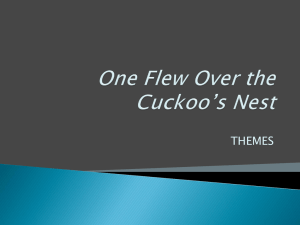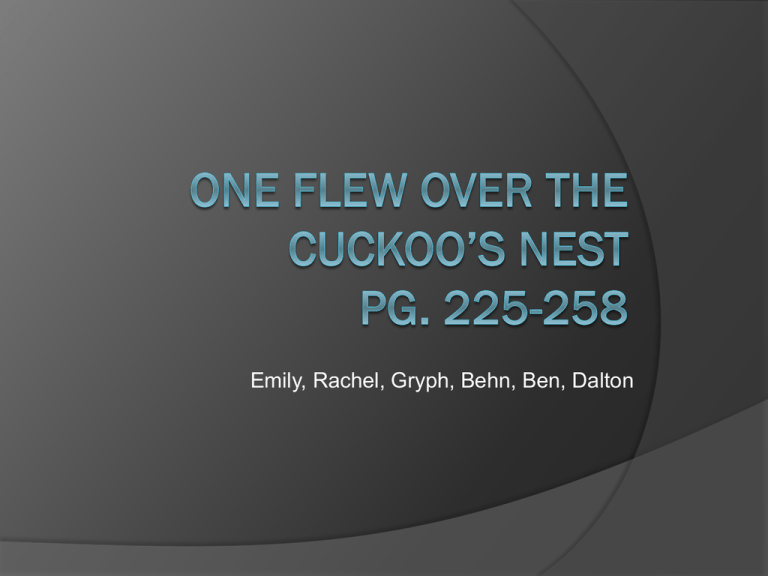
Emily, Rachel, Gryph, Behn, Ben, Dalton
Summary
In the morning, Chief sees his name signed up for the fishing trip and he gets
really excited.
Everyone is wondering who signed up Chief’s name.
Chief acts deaf to their laughing at him but when they stick a broom out to him to
do some work, he turns around and walks the other way. He has never before
refused to do what they ask of him.
The Acutes get ready for the trip, while the Chronics wander around and stare at
Chief. He feels guilty because he’s the only Chronic invited (or going) on the trip.
McMurphy says George seems to know a thing or two about fishing, and George
admits that he worked as a fisherman for twenty-five years.
McMurphy declares George will be their captain.
Billy Bibbit whistles, letting her know how good she looks.
At the gas station, the attendants realize that they’re from the hospital and try to
manipulate them into buying more expensive gas and other items that they don’t
need
Harding suddenly realizes that mental illness contains a sort of
power. The more insane a man becomes, the more powerful he can
be.
Chief muses in retrospect that the patients thought that McMurphy
had taught them to be courageous and use it. Really, though, with
McMurphy, the men were just pretending to be brave, not
really being brave.
The captain who was supposed to take them out said he needed a
signed waiver clearing him with the authorities.
Billy catches the first fish. Then Chief catches a huge fish that’s as
big as a fence post.
Chief decides that McMurphy knows that you have to just laugh at
the things that hurt you.
Symbolism
There are many different symbols in (OFOCN), But
the one that stood out the most to me was,
McMurphy’s Boxer shorts. McMurphy’s boxer shorts
are black satin with a pattern of white whales with
red eyes.
The author gave McMurphy these shorts to show
that McMurphy himself is a symbol
-Also, The whales on the boxer shorts call to mind
Moby Dick; a popular icon in American literature, and
evil that inspires Captain Ahab’s task of catching the
beast. This symbol suggests that McMurphy is to
Ratched as Moby Dick is to Ahab.
Themes
Women as castrators
With the exception of the prostitutes, who are portrayed as good, the women in One
Flew Over the Cuckoo’s Nest are uniformly threatening and terrifying figures.
Bromden, the narrator, and McMurphy, the protagonist, both tend to describe the
suffering of the patients as a matter of emasculation or castration at the hands of
Nurse Ratched and the hospital supervisor, who is also a woman. The male
characters seem to agree with Harding, who complains, “We are victims of a
matriarchy here.” Most of the male patients have been damaged by overpowering
women. Bromden’s mother was portrayed as a castrating women; her husband took
her last name, and she turned a big, strong chief into a small, weak alcoholic.
Importance of expressing sexuality
It's implied throughout the book that a healthy expression of sexuality is a key
component to sanity. Most of the patients have warped sexual identities because of
damaging relationships with women. Perverted sexual expressions are said to take
place in the ward; the aides supposedly engage in “sex acts” that nobody witnesses,
and on several occasions it is suggested that they rape patients, such as Taber, with
Ratched’s implicit permission, symbolized by the jar of Vaseline. Harding says,
“comical little creatures who can’t even achieve masculinity in the rabbit world.”
Missing from the halls of the mental hospital are healthy, natural expressions of
sexuality between two people.
Questions
After McMurphy insisted on driving past his
childhood home where he saw the yellow
rag hanging from the tree which was from
the dress that was from the first girl he had
ever “slept with”, why do you think he says
that she turned him a “dedicated lover”?
How does he know that from being so
young?
Is it possible to cure people with mental
illnesses? Is it possible to incorporate
individuals with mental illnesses into
modern society?

